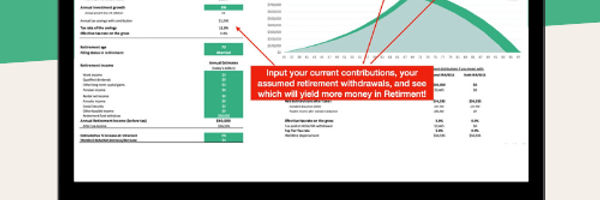The Roth 401(k) was first made available to retirement planners back in 2006. Since that time, many employees have found themselves faced with the question: Should I start contributing to a Roth 401(k)? We're going to help answer that question by discussing its rules, contribution limits, withdrawals, distributions, as well as rollovers.

Roth IRA or 401k? This template will answer your questions.
With this template, you will get:
All DFY, simply add your details
Charts for comparison and clear answer
Easily update for any year (2023, 2024, 2025, etc…)

Background of the Roth 401(k)
The Roth 401(k) provision was part of the Economic Growth and Tax Relief Reconciliation Act that became effective in 2006. As its name implies, a Roth 401(k) combines the contribution features of 401(k) plans with the tax-free growth advantage of Roth IRAs. The appeal of the Roth 401(k) seems too good to be true, and a recent survey conducted by benefits giant Hewitt Associates estimates that nearly 35% of companies are likely to offer this type of plan to its employees.
Roth 401(k) Basics
The following is an example of how the basic Roth 401(k) plan will work. Keep in mind that each employer has some latitude in how they want to administer their plan. In fact, just because it's possible for a company to offer a plan to its employees, does not mean that all employers will take advantage of this provision.
Employees offered a chance to participate in a Roth 401(k) will now have the option of setting money aside from their regular paycheck on an after-tax basis to a retirement account that will grow tax-free forever. That means the accountholder never has to pay taxes on the growth portion of the account, and they don't have to pay federal income taxes at the time of withdrawal, just like a Roth IRA.
Benefits of a Roth 401(k)
Perhaps the most important question employees will struggle with is this: Should I fund a Roth 401(k) or stick with my old 401(k) plan? For many, the question really comes down to income taxes, and their income tax bracket.
By making a before-tax contribution to a 401(k) plan, it's possible to reduce a current tax liability. With a Roth 401(k), plan participants are making after-tax contributions.
Before-tax contributions to a 401(k) reduces taxable income now, but income taxes on the original funds and earnings is owed when funds are distributed in retirement.
Roth 401(k) contributions don't reduce taxable income right now, but these funds, and earnings on them, are tax free at retirement; as long as the accountholder is at least age 591/2, and their Roth 401(k) account is at least five years old.
If someone believes they are in a higher tax bracket today than they will be in retirement, then sticking with a 401(k) plan might be their best move. If they think their tax bracket will stay the same or increase when retired, then a Roth 401(k) is probably the best choice.

Roth IRA or 401k? This template will answer your questions.
With this template, you will get:
All DFY, simply add your details
Charts for comparison and clear answer
Easily update for any year (2023, 2024, 2025, etc…)

Roth 401(k) Rules
The Roth 401(k) rules follow the pattern mentioned above; they're really just a combination of the Roth IRA rules and 401(k) rules. The information listed below gives a more detailed explanation of what to expect if offered a chance to participate in this kind of retirement plan.
Roth 401(k) Contributions
The contribution rules for Roth 401(k)s are the same as those for existing 401(k) plans. Specifically, the maximum contribution a participant can make to a Roth plan is the same as today's 401(k), including the catch up provision. That means in 2020 and 2021, it's possible to contribute up to $19,500 to a plan (plus employer matching, which can only go into a traditional 401(k) plan), and employees age 50 and over can contribute up to $26,000, which includes a catch up contribution of $6,500.
In 2020 and 2021, Roth 401(k) contributions are$19,500. For those age 50 years and older in 2020, the $6,500 catch-up contribution keeps the total limit at $26,000.
It's also possible to make a "standard" Roth IRA contribution that is in addition to the limits just mentioned. With the tax advantages of this new plan, the Roth 401(k) will be hard to resist. That's because it also opens up the tax advantages of Roth IRAs to a much broader number of employees; many highly-compensated individuals that were not eligible to contribute to a Roth IRA.
Employer Contributions
If a Roth 401(k) plan includes employer matching, then federal income taxes are due on the employer match when withdrawn. Remember, contributions will be on an after-tax basis, and income taxes on employer contributions are not due when they went into the account, so accountholders will have to pay when they take a distribution.
Roth 401(k) Withdrawals
Like its predecessors, the Roth 401(k) was established as a retirement plan. That means the IRS looks down on withdrawals that occur before age 59 1/2. Hardship or other types of withdrawals are subject to the same 401(k) rules and penalties that are currently on the books. The Roth 401(k) minimum distribution rules are also similar to 401(k) withdrawals, meaning accountholders need to start to take distributions when they reach age 70 1/2.
Roth 401(k) Rollovers
The way the law is written, it's possible to roll-over a Roth 401(k) into a Roth IRA when employment is terminated or at retirement. This seems to be a loophole which allows accountholders to get around the minimum distribution requirement at age 70 1/2; just rollover the Roth 401(k) into a Roth IRA (which has no minimum distribution requirement).
To get a better idea of Roth 401(k) plans, you can use our Roth 401(k) calculator.

Roth IRA or 401k? This template will answer your questions.
With this template, you will get:
All DFY, simply add your details
Charts for comparison and clear answer
Easily update for any year (2023, 2024, 2025, etc…)

Final Words on Roth 401(k) Plans
Perhaps the most difficult choice for most employees involves the pre-tax contribution of a 401(k) versus an after-tax contribution of a Roth 401(k). Remember, if planning to maintain the same funding levels on an after-tax basis, this means less take home pay in a check.
Keep in mind this decision is oftentimes based on what someone believes will be their tax bracket, or tax rate, in the future. If they expect their tax bracket to be higher, or the same, as it is now when they are retired, they are probably better off with a Roth 401(k). If they think they will be in a lower tax bracket in retirement, then the tax free withdrawal advantage of the Roth 401(k) plan is diminished.
